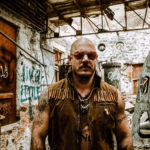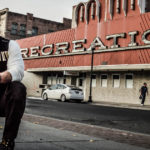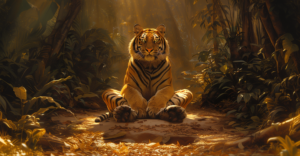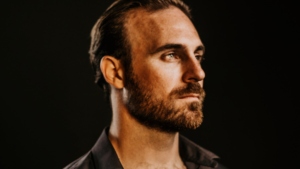The Joy of Thor

(Click here to download the audio version.)
The primary role of Thor is the primary, evolutionary role of all men — to protect the perimeter inhabited by his people and to do battle with chaotic forces that threaten its order, prosperity and continuity.
It is only when that zone of security has been established and maintained that any of the civilized joys of life can develop and be experienced in their fullness. Without security, there is no art, no love, no higher learning — only anxiety and the struggle to survive.
Thor is a guardian — protector of Asgard, of sailing ships, of crops and the common folk. In Dumézil’s tripartite ordering of Indo-European societies, he is a manifestation of the warrior archetype. He is the hammer of the gods and the people — the juggernaut of the Kshatriya — a crushing force set loose on malevolent jötnar and all encroaching forces of chaos and disorder.
In the words of Longfellow, his “eyes are lightning” and his name means “thunder,” with an origin reaching through the Proto-Germanic “Þunraz” all the way to the
Proto-Indo-European tongue of the steppe.
To fight and protect — this is the role of Thor. He is a warrior. That is his job and his duty.
But what does it feel like — to experience being thunder? What does it feel like to be a terrible rumble in the sky that seems to shake the very earth?
It sounds like it feels pretty good. It sounds like it feels like power and winning.
Nietzsche wrote that, “…a living thing seeks above all to discharge its strength…”
This is the joy of Thor, of being Thor, of being the personification of thunder itself. To have strength and exert it — to use it. To bring the BOOM.
This isn’t Thor’s duty or his higher purpose, it is simply what he is and what he does. In the stories about Thor, he is always revving his engines, looking for a reason to do what he really wants to do and to be what he really is. He’s chomping at the bit, waiting for an opportunity to become Þunraz. And when the god of thunder becomes thunder, I imagine the corner of his grimace turns upward just a bit.
Because it feels good to exert strength. Because it feels good to BE thunder.
One might call the gods projections, or mysteries, or eternal truths. In some sense, they represent aspects of ourselves. They are pieces of human nature.
Strength is one of the defining characteristics of Thor, and it is also one of the defining characteristics of men. Greater average strength is one of the qualities that distinguishes men from women. All men are not stronger than all women, but most men are stronger than most women. Strength differentiates men, and greater strength helped us to perform our differentiated role and responsibility throughout the majority of our evolutionary history. Men needed to be stronger to protect their territories and the more vulnerable members of their tribes and families.
But this strength, this virile potentiality, is also part of what we are. Having and using this greater strength is a joy in the way expressing any of one’s talents can bring great satisfaction. In the way that an artist fulfills his potential in painting the best painting he is able to paint, or a mother is fulfilled when she puts everything she has into raising and nurturing a child to the best of her ability, a man fulfills an aspect of his potential when he discharges his strength. He becomes more of what he is, and there is a magnificent joy in that becoming.
Several years ago, I wrote that I “train for honor.”
I was looking for a higher reason — beyond mere narcissism or physical maintenance — some greater purpose for training. It has always been the job of men to be strong and to demonstrate that strength, and in an age where weakness is encouraged and even celebrated, I considered strength training of any kind to be a revolt against the modern world. I wrote that I trained to be worthy enough to carry water for my barbarian fathers — for men who lived harder lives in a harder world. That I trained to avoid being a living, breathing embarrassment to their memory. I wrote that training for honor meant training to earn the respect and admiration of my spiritual peers and the men who I myself admired as exemplars of masculinity and the tactical virtues.
It is important — even defiant in this rootless age — to express this kind of commitment to the memory of your ancestors. In this emasculated era where even the word “honor” — when employed solemnly and seriously in its traditional patriarchal sense — has become socially taboo, to show a commitment to earning and maintaining your reputation within an exclusive group of men is absolutely radical. Today, I do train to be an example to men in my circle, to earn and reaffirm their respect and esteem, and at the very least, to avoid embarrassing them or making them look weak by association. Training to honor your peers and to honor the memory of your stronger forebears are both high, purposeful and significant motivations for any kind of self-improvement. And, if you recognize yourself to be in your own honest and self-aware estimation that “Exhibit A” of modern male weakness and dissolution, these are probably the best reasons to begin training, and begin training hard. If you have been training for a long time and you are thinking about stopping your training to rest on your laurels and regale eye-rolling youths with stories of how strong you used to be — about how much you benched in 2003 — these are probably the best reasons to keep training. Until you fucking die.
But the truth for me today is that I like training. In fact, I love training. It’s actually my favorite thing to do and the hours I spend in the gym are usually the best and happiest hours of my day. I don’t have to force myself to train. I have to force myself to do things that make me money so that I can keep training.
The possibility of shame and dishonor is a powerful motivator. The possibility of disappointing men who I respect and men who respect me and men who look up to me in some way is a powerful motivator. And yes, the disgraceful prospect of being the withering, ignoble end of a line of stronger and harder men should get your ass into the gym.
Shame and dishonor are negative motivators. And they work. But they are tolerances. Baselines. Your back against a wall covered in spikes.
The attainment of honor is a positive motivator. Self-improvement, self-creation, self-revelation and becoming the best version of myself that I can be at any given time — those are positive motivators.
At this point in my life, I want positive motivators.
I want to do things because I am passionate about them, because I love doing them, because they give me a sense of fulfillment. I train because I love being strong. I love feeling strong. I train because I want to be mighty and beautiful and because I believe that it is good and RIGHT to be mighty and beautiful. I train because — like every righteous living beast — I want to discharge my strength as hard as I can for as long as I can.
When I walk into a gym I want to train for no one else and compared to no one else.
I want to train because I’m alive and I want to feel alive.
Because I’m a man and it feels good to be a man.
Because I’m strong and it feels good to be strong.
Because I want that one moment every day when I am fucking THUNDER.
Because I want to know and feel the JOY OF THOR.
!:ÞUNRAZ:!

THE CHALLENGE OF THOR
by Henry Wadsworth Longfellow
I am the God Thor,
I am the War God,
I am the Thunderer!
Here in my Northland,
My fastness and fortress,
Reign I forever!
Here amid icebergs
Rule I the nations;
This is my hammer,
Miölner the mighty;
Giants and sorcerers
Cannot withstand it!
These are the gauntlets
Wherewith I wield it,
And hurl it afar off;
This is my girdle;
Whenever I brace it,
Strength is redoubled!
The light thou beholdest
Stream through the heavens,
In flashes of crimson,
Is but my red beard
Blown by the night-wind,
Affrighting the nations!
Jove is my brother;
Mine eyes are the lightning;
The wheels of my chariot
Roll in the thunder,
The blows of my hammer
Ring in the earthquake!
Force rules the world still,
Has ruled it, shall rule it;
Meekness is weakness,
Strength is triumphant,
Over the whole earth
Still is it Thor’s Day!
Thou art a God too,
O Galilean!
And thus singled-handed
Unto the combat,
Gauntlet or Gospel,
Here I defy thee!




